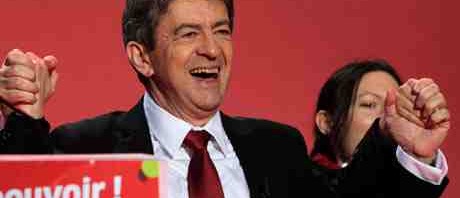
No wonder the Left Front candidate is on the rise in France. He offers practical solutions where neoliberalism has failed, writes Philippe Marlière, professor of French and European politics at University College, London
Superbly ignored by the media until recently, Jean-Luc Mélenchon is the new flavour of the day in the French presidential campaign. In truth, while trying to account for his dramatic rise in the polls – latest reports put him at 17% of the vote – most commentators could not help pour scorn on the Left Front candidate.
A survey of the main articles recently published in the British media provides a compelling case study of political prejudice and misunderstanding. Mélenchon is described as an “Anglo-Saxon basher with a whiny voice” (the Independent), a “populist” who’s “on the hard-left” (all newspapers) and a “bully and a narcissist, out to provoke” (BBC). More sympathetic commentaries compare him to George Galloway or depict him as a “far-left firebrand”, a “maverick” and the “pitbull of anti-capitalism”.
It is striking that the more favourable assessment of Mélenchon’s politics remains off the mark. Mélenchon is seen as a “lovable but old-fashioned leftwinger”. This fails to capture the essence of his political ambitions. Mélenchon’s rise has nothing to do with “1970s-style politics and nostalgia”, but is linked instead to his resolute take on the current capitalist crisis. He tells audiences that the austerity policies implemented across Europe are not only unfair but also counterproductive (even the Financial Times agrees). Mélenchon’s debating skills serve his cause, but he is also a lettered pedagogue: a dignified politician who has never participated in vulgar reality shows. What is more, Mélenchon is a French republican and a socialist, not a “far-left” or a fringe politician. He spent 30 years in the Socialist party unsuccessfully arguing that it should be a force at the service of ordinary workers, and he was a cabinet minister in Lionel Jospin’s government.
Oratory is politically useless if one does not have an important message to deliver. Mélenchon has one: neoliberalism has failed, so it would be suicidal to persist with its inadequate policies. The French MEP also had a credible programme. In didactically crafted speeches or in media interviews, he radically departs from mainstream politicians by explaining that the economic crisis is systemic, that is to say that it is due to our flawed political choices and priorities. Our societies have never been as productive and wealthy as today, but the majority of the population are getting poorer despite working harder and harder. The problem is not a question of wealth production (as neoliberals and Blairite social democrats would have us believe), but of redistribution of wealth.
In France raging pundits and opponents call the Left Front programme an “economic nightmare” or a “delirious fantasy”. Shouldn’t they instead use this terminology to describe the banking debacle or austerity policies across Europe? Mélenchon’s growing number of supporters view it as common sense and salutary: a 100% tax on earnings over £300,000; full pensions for all from the age of 60; reduction of work hours; a 20% increase in the minimum wage; and the European Central Bank should lend to European governments at 1%, as it does for the banks. Here are a few realistic measures to support impoverished populations. Is this a revolution? No, it is radical reformism; an attempt to stop the most unbearable forms of economic domination and deprivation in our societies. Fat cat bosses may leave France; they will be replaced by younger and more competent ones who will work for a fraction of their wages. “Humans First!” is more than a manifesto title, it is a democratic imperative: a sixth republic in place of the current republican monarchy; the nationalisation of energy companies (as energy sources are public goods) and, less often noticed, the ecological planning of the economy, the core of Mélenchon’s political project.
Mélenchon has done French democracy a further favour. In a memorable TV debate, he emphatically defeated the extreme right for the first time in 30 years. Concentrating on policy details, Mélenchon demonstrated that Marine Le Pen’s programme was regressive for women. Furthermore, he smashed to pieces the myth of the Front National as a party that has the working class’s best interests at heart. Le Pen appeared lost for words and ill at ease.
Jean-Luc Mélenchon Discours de Villeurbanne with English Subtitles by kominaaa
Mélenchon’s campaign politicises the young. He appeals to the working class, which, contrary to some claims, has largely shunned Le Pen and which has been abstaining from the vote. For the first time in decades, Mélenchon is helping the left to reconnect with the popular classes. For Mélenchon, free market politics does not work and inflicts unnecessary suffering on the people. No other European politician is better placed than he is to convincingly argue that point.


2 Responses
100% income tax – now there’s an interesting thought. The concept of “enough” and the fact that there comes a point where literally any risk, effort or skill has been adequately rewarded is long overdue. I can just about accept making Wayne Rooney rich, but why should his dynasty reap the rewards in perpetuity?
Rather Mélenchon’s one head than the useless neoliberal “Two Eds” that pass for an ‘opposition’ in Britain. Vote Scottish Anti-Cuts Coalition or TUSC candidates in the local elections. There is a new alternative.